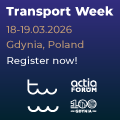TEN-T Review Sand Castle Without 32 Billion Euro Budget
2012 04 24
- Details
ESPO calls for transparent methodology to justify allocation of TEN-T funding to projects of common interest.
In a unique common appeal, more than 25 European transport organisations, covering all modes and nodal points, urged EU policy makers to safeguard the 32 billion Euro budget that has been allocated to EU transport infrastructure within the Connecting Europe Facility (CEF) in the 2014-2020 budget. If the EU wants a transport infrastructure network that can meet traffic demand and support economic activity, it will need at least 250 billion Euro by 2020 according to European Commission estimates. This sum will remove bottlenecks and complete missing links in the core network of the Trans-European Transport Networks (TEN-T). A further 250 billion Euro will be needed to improve the comprehensive network, in order to provide accessibility to the core network. With the open letter that was issued this afternoon, the European transport industry expresses its collective concern that not enough funds will be available to cover investment needs. The 32 billion Euro, earmarked by the European Commission to the core network in the Connecting Europe Facility, only covers a small share of the investment needs. It furthermore represents only 3% of the total EU budget for the period 2014-2020. But this modest share is nevertheless under huge pressure from Member States who are keen to cut it down to even more marginal proportions. This would turn the proposed review of the Trans-European Transport Network policy into a sand castle, to the detriment of Europe’s economy.
The initiative for the open letter was taken by the European Federation of Inland Ports (EFIP). EFIP Director Isabelle Ryckbost pointed at the fact that the proposed transport budget actually compensates important cuts in regional funds. “It is important to put the proposed TEN-T budget into perspective. The 32 billion might seem a serious increase at first glance. We must however bear in mind that at the same time, other sources of funding for transport infrastructure will be reduced or even removed. This is certainly the case for the transport funding possibilities in the European Regional Development Fund in some regions, but will also count for other sources of funding like the Marco Polo programme, which in the future will have to be financed through this same TEN-T budget. The 32 billion proposed is therefore a vital minimum and must be guaranteed more than ever.”
Given that ports form one of the cornerstones of the new TEN-T policy, ESPO actively supports the campaign to safeguard the 32 billion Euro budget. “We are however not asking for a blank cheque”, said ESPO Secretary General Patrick Verhoeven, “As ESPO, we insist that TEN-T funds should only be spent on projects that generate measurable EU added value, in terms of transport efficiency, sustainability and/or territorial cohesion. We have therefore invited the Commission to develop a transparent methodology that would justify TEN-T funding so that in the end genuine ‘projects of common interest’ are supported.”
The full open letter can be read on the ESPO website where the ESPO position on the TEN-T review can be found as well.
ESPO
The magazine SEA has been published since 1935
International business magazine JŪRA MOPE SEA has been published since 1999
The first magazine in Eurasia in the four languages: English, Chinese, Russian and Lithuanian
|
|





.jpg)





